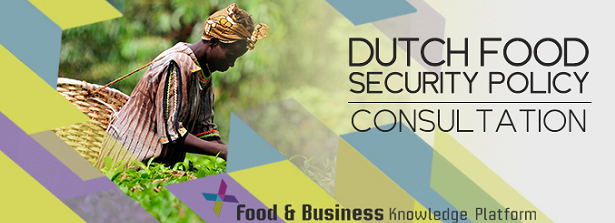Final report on consultation on food security policy

The Food & Business Knowledge Platform (F&BKP) presents its final report (PDF) on the consultation on Dutch food security policy. The report analyzes all contributions to the consultation and presents a number of recommendations.
The consultation was originally opened by the Food & Business Knowledge Platform (F&BKP) on July 1, 2014 and closed on September 15, 2014. A total of 82 contributors participated in the consultation, which resulted in 154 contributions on six topics. All 154 contributions remain available online on the F&BKP website and are available in a separate document (PDF).
The aim of the final report is not to give a detailed summary of the contributions, but to provide a clear overview of the main issues, controversies and common ground, together with some policy recommendations illustrative of what the contributors proposed. The contributions show that the government should continue its focus on food security but should do so within an integrated intervention strategy that takes into account the context at the different levels, and the ambition for impact at systemic level. The report makes the following recommendations:
- Dutch food and nutrition policy must take into account the recommendations of former United Nations Rapporteur on the Right to Food Olivier De Schutter.
- The ideas on agro-ecology should be taken seriously and linked with ideas on market-based industrial intensification.
- There is support for the acknowledgement of diversity of agricultural systems combined with a call to connect them within agricultural strategies.
- A holistic approach is necessary, like policy coherence, nexus-thinking, cross-sector opportunities, etc.
- Integrated programmes must take into account sustainable and inclusive measures to generate maximum impact.
- Commitment to the transition of smallholders to entrepreneurs.
- Support for the targets of the Zero Hunger Challenge, although these targets must be linked and not seen separately.
- Acknowledgement that voluntary standards are important tools, but that they will not change the system.
- Most contributors did not challenge the current ’trade and aid’ policy of the Dutch government. However, they want more attention to regional trade and more attention be given to local businesses and entrepreneurs in developing countries.
The aim of the consultation was to provide input for the preparation of a policy paper on food security to be published by the Dutch government in October 2014. The F&BKP has shared all contributions with the Ministries of Foreign Affairs and Economic Affairs, which have used them in the drafting process of their policy letter to Parliament. Both ministries expressed appreciation of the high quality of the contributions.
The F&BKP acknowledges that the rich and high level of input in this consultation and the many explicit and implicit references to policy recommendations could not be captured fully in the final report. The Platform has therefore advised the ministries that the input from the consultation should not be used only for the upcoming policy paper, but can also be useful for the next phase of implementing the policy in interventions and programmes. The F&BKP will use the information from the consultation to develop the food security knowledge agenda further.
The consultation was organized around five themes, derived from the international food security targets of the Zero Hunger Challenge. They served as an entry point for an open online conversation on the F&BKP website. Participants could make their contribution by selecting the targets most relevant to their work. The five themes are related to the following questions: how can the Netherlands most effectively contribute to achieving the targets:
- 100% access to adequate food all year round
- Zero stunted children less than 2 years
- All food systems are sustainable
- 100% increase in smallholder productivity and income
- Zero loss or waste of food?
An additional question is are there elements missing in the Zero Hunger Challenge and this consultation which should be included in Dutch food security policy?
Please find the report and all contributions here:





